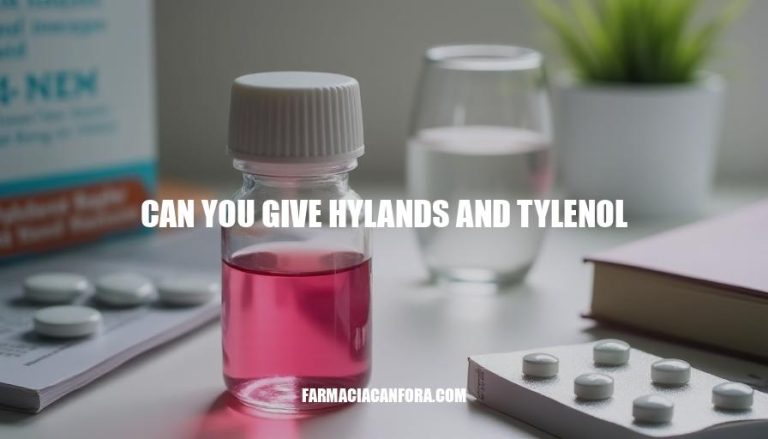


Hyland’s and Tylenol are well-known names in over-the-counter medicine, each with its own purpose. Hyland’s makes natural remedies for things like pain, fever, and colds. Tylenol uses acetaminophen to reduce fever and ease mild to moderate pain.
The question of whether to use these two products together is important.
Since they work in different ways, it’s crucial to think about the potential benefits and risks. This matters especially for people who take care of others or are looking for alternative ways to manage symptoms. By understanding how well they work together, we can make informed choices about our health.
The question of whether Hylands and Tylenol can be given together often arises in situations involving children or adults experiencing symptoms such as fever, pain, or cold-related discomfort. Hylands products, being homeopathic remedies, are commonly used for mild cold and cough symptoms, while Tylenol (acetaminophen) is a widely used medication for reducing fever and relieving pain.
Safety concerns include the potential for overlapping ingredients in over-the-counter medications. While Hylands products are homeopathic and typically contain highly diluted ingredients, Tylenol contains acetaminophen, which can be harmful if overdosed.
Some cold and cough medications may already include acetaminophen, increasing the risk of accidental overdose if combined with Tylenol. Additionally, acetaminophen is known to affect liver function when taken in excessive amounts, making it crucial to adhere to recommended dosages.
Dosing guidelines for Tylenol generally recommend 10-15 mg per kilogram of body weight for children, administered every 4-6 hours as needed, without exceeding five doses in 24 hours. Hylands products, on the other hand, have specific dosing instructions based on the product and age group, as they are designed to address symptoms like runny nose, cough, or congestion.
It is essential to read and follow the instructions on the packaging for both medications.
Consulting a healthcare professional is vital before combining any medications, even over-the-counter ones. A healthcare provider can assess the individual’s symptoms, medical history, and current medications to ensure there are no contraindications or risks of adverse effects. They can also provide personalized dosing recommendations and guidance on whether the combination of Hylands and Tylenol is appropriate for the specific situation.
1hellopharmacist.com2www.healthtap.com3community.babycenter.com4pharmaceutical-journal.com5www.nice.org.uk
When considering whether to use Hyland’s and Tylenol together, it’s essential to weigh the potential benefits and risks. Since they work in different ways, understanding how well they complement each other is crucial, especially for caregivers or those seeking alternative symptom management methods.
Hyland’s products are homeopathic remedies often used for mild cold and cough symptoms, while Tylenol contains acetaminophen for reducing fever and relieving pain. However, safety concerns arise due to the potential for overlapping ingredients in over-the-counter medications.
Dosing guidelines vary between the two products: Tylenol recommends 10-15 mg per kilogram of body weight for children, whereas Hyland’s has specific dosing instructions based on product and age group. It’s crucial to read and follow packaging instructions for both medications.
Before combining any medications, including over-the-counter ones like Hyland’s and Tylenol, consulting a healthcare professional is vital. They can assess individual symptoms, medical history, and current medications to ensure there are no contraindications or risks of adverse effects. A healthcare provider can also provide personalized dosing recommendations and guidance on whether the combination is suitable for the specific situation.
Ultimately, making informed decisions about health requires careful consideration of potential interactions between different products. Checking with medical experts ensures that individuals receive accurate guidance tailored to their unique needs.